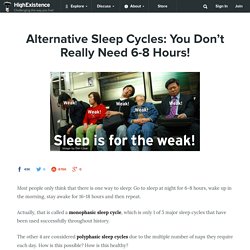

The Official Uberman Sleep Blog. Dymaxion Sleep Cycle. By bgjooon on July 1st, 2010 For those of you who have no idea what I’m referring to, here is an excerpt from DymaxionDuo explaining the argument: “Most people sleep on a monophasic cycle; that is, one core sleep that usually lasts around 8 hours long.

In those 8 hours, a person will generally get about 2 hours of REM sleep. REM sleep is the regenerative stage of sleep. Some scientists believe that the non-REM stages are simply waste sleep, and that they might not be needed. The full article can be found here . From that (and a few other things that I had heard about polyphasic cycles), I decided to try it myself. Long story short, I stopped. Let me know if you’ve done this and what your experience was! Dymaxion Duo. From reading others' experiences, it takes 1-2 weeks for your body to adjust to the new schedule. The first few days, you basically deprive yourself of sleep; you still lay down for your naps, but more than likely won't sleep very well. After a while, your body starts forcing itself to get REM sleep when you take naps. The tough part here is to lay down when you are supposed to, and get up when you are supposed to. Then, after a few more days, your body will start to get the hang of things, and everytime you lay down for a nap, you'll get about 30 minutes of REM sleep that you need.
Since you wake up straight out of REM, you won't wake up groggy. After the body transition phase, the next couple weeks are a mental transition. A Polyphasic Experiment. Alternate Sleep Cycles. Most people only think that there is one way to sleep: Go to sleep at night for 6-8 hours, wake up in the morning, stay awake for 16-18 hours and then repeat.

Actually, that is called a monophasic sleep cycle, which is only 1 of 5 major sleep cycles that have been used successfully throughout history. The other 4 are considered polyphasic sleep cycles due to the multiple number of naps they require each day. How is this possible? How is this healthy? Well the most important of every sleep cycle is the Stage 4 REM (Rapid Eye Movement) sleep, which has been shown to provide the benefits of sleep to the brain above all other stages of sleep.
This way, you still get the benefits of 8 hours of sleep without wasting all of the time it takes to get to REM cycles, resulting in a much more efficient sleep cycle. Uberman Cycle: 20 to 30 minute naps every 4 hours, resulting in 6 naps each day. Everyman Cycle: One longer “core” nap that is supplemented with several 20-30 minute naps. Dymaxion Cycle: How Much Sleep Do You Need? Sleep Cycles & Stages, Lack of Sleep & Getting the Hours You Need.
The power of sleep Many of us try to sleep as little as possible.

There are so many things that seem more interesting or important than getting a few more hours of sleep, but just as exercise and nutrition are essential for optimal health and happiness, so is sleep. The quality of your sleep directly affects the quality of your waking life, including your mental sharpness, productivity, emotional balance, creativity, physical vitality, and even your weight. No other activity delivers so many benefits with so little effort! Understanding sleep Sleep isn’t exactly a time when your body and brain shut off. The good news is that you don't have to choose between health and productivity. Myths and Facts about Sleep Myth 1: Getting just one hour less sleep per night won’t affect your daytime functioning.
Myth 2: Your body adjusts quickly to different sleep schedules. Myth 3: Extra sleep at night can cure you of problems with excessive daytime fatigue. How many hours of sleep do you need?